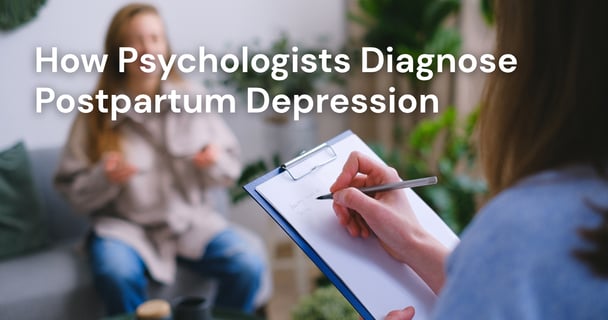How Psychologists Diagnose PPD
7/2/20254 min read
When you’re in the fog of postpartum depression (PPD), even identifying what’s happening can feel overwhelming. You may wonder: Is this exhaustion? Hormones? Am I just bad at this? These thoughts can be confusing, especially when you’re expected to feel joy and gratitude after bringing a baby into the world.
Seeking professional help is a brave and vital step. But many parents hesitate because they’re not sure what the diagnostic process looks like. Will I be judged? Do I need to “prove” something? What if they don’t believe me?
At Peace Temple, we believe in demystifying the experience. Diagnosing PPD is not about slapping on a label - t’s about helping you understand what you're feeling, so you can get the support you deserve.
This article will walk you through how psychologists assess and diagnose postpartum depression, what tools they use, and what to expect when you take that first step into care.


What Is Postpartum Depression?
Postpartum depression is a mood disorder that occurs after childbirth, typically within the first year. Unlike the “baby blues,” which usually resolve within two weeks, PPD persists and often interferes with daily functioning and maternal well-being.
Common symptoms include:
Persistent sadness or emptiness
Loss of interest in activities
Feelings of guilt or worthlessness
Difficulty bonding with the baby
Anxiety, irritability, or rage
Fatigue or insomnia
Changes in appetite
Thoughts of self-harm or suicide
PPD can also co-occur with postpartum anxiety or obsessive-compulsive symptoms so thorough assessment is key to getting the right diagnosis and treatment.
When Should You Seek a Diagnosis?
If your symptoms:
Persist for more than two weeks,
Worsen over time, or
Impact your ability to function or care for yourself/your baby…
…it’s time to reach out.
You don’t need to be in crisis to seek support. At Peace Temple, we encourage mothers to come in at the earliest signs of distress—before things feel unmanageable.
Step-by-Step: How Psychologists Diagnose PPD
1. Initial Screening and Intake
Your first session with a psychologist typically includes a clinical interview, where you're invited to speak freely about your experiences. You’ll be asked about:
Your mood and daily functioning
Sleep, appetite, and energy levels
Thoughts or feelings about motherhood
Bonding with your baby
Any history of mental health issues
Social support and relationship dynamics
This process is not an interrogation - it’s a compassionate, confidential conversation designed to understand the whole you, not just a list of symptoms.
2. Use of Diagnostic Tools and Questionnaires
Psychologists often use standardized screening tools to supplement the clinical interview. These tools help clarify symptom patterns and severity.
Some common assessments include:
Edinburgh Postnatal Depression Scale (EPDS)
A widely used 10-question screening tool that evaluates mood, anxiety, and suicidal ideation in the postpartum period.PHQ-9 (Patient Health Questionnaire)
Assesses the presence and severity of depressive symptoms over the past two weeks.GAD-7 (Generalized Anxiety Disorder Assessment)
If anxiety symptoms are prominent, this tool helps assess generalized anxiety severity.
These tools are not meant to “test” you - they’re guides to help the clinician understand how deep the distress runs and where to focus treatment.


Diagnostic Criteria for PPD
According to the Diagnostic and Statistical Manual of Mental Disorders (DSM-5), PPD falls under the category of “Major Depressive Disorder, With Peripartum Onset.”
To be diagnosed, a person must have:
At least five depressive symptoms (e.g., sadness, sleep changes, fatigue, guilt) present most of the day, nearly every day, for at least two weeks
At least one of those symptoms must be low mood or loss of interest/pleasure
Significant distress or impairment in functioning
Onset during pregnancy or within 4 weeks postpartum (though clinicians widely accept symptoms within the first year postpartum)
At Peace Temple, we also consider context—sleep deprivation, hormonal shifts, trauma history—so diagnosis is never reduced to a checklist. We see the person, not just the presentation.
Ruling Out Other Conditions
PPD can sometimes overlap with or be mistaken for:
Postpartum Anxiety
Postpartum OCD (intrusive thoughts, compulsions)
Postpartum Psychosis (a rare and severe condition involving delusions or hallucinations)
Part of the diagnostic process includes differentiating between these conditions, so treatment can be tailored precisely to what’s needed.
If a parent is experiencing intrusive thoughts or visual images that feel disturbing, for instance, a skilled clinician can help distinguish whether it’s OCD (which is common and treatable) or an emergent psychotic episode (which requires urgent care).
What Happens After Diagnosis?
A diagnosis isn’t the end—it’s the beginning of targeted support.
Once PPD is identified, a psychologist may recommend:
Talk therapy (Cognitive Behavioral Therapy, Interpersonal Therapy, or trauma-informed modalities)
Partner-inclusive sessions, if relationship strain is contributing to symptoms
Referrals to psychiatrists if medication could be beneficial
Support groups, where connection with other mothers can reduce isolation
At Peace Temple, we build customized care plans based on diagnosis, life circumstances, parenting context, and personal goals.
Common Fears and the Reassuring Truth
“Will they think I’m a bad mother?”
No. PPD doesn’t make you a bad mother. It makes you a mother in pain—and one who’s brave enough to seek healing.
“What if I say I’ve thought about hurting my baby?”
Intrusive thoughts are a known symptom of postpartum OCD or anxiety. A skilled clinician will explore the nature of those thoughts—whether they’re distressing or delusional—and respond with appropriate care, not punishment.
“Will they take my baby away?”
In nearly all cases, the answer is no. Mental health professionals want to help you stay connected to your baby by ensuring you feel safe, supported, and emotionally well.
Final Thoughts: You’re Not Just a Diagnosis—You’re a Whole Human
Getting diagnosed with PPD doesn’t mean you’re broken—it means your mind and body are responding to immense change, pressure, and hormonal upheaval. And instead of powering through it alone, you’re making a powerful choice: to let someone in.
At Peace Temple, we honor that choice by offering diagnosis with compassion, treatment with clarity, and healing with humanity.
If you’ve been wondering whether what you’re feeling is “normal,” or if you’ve been quietly suffering without answers—this is your sign. It’s okay to ask. It’s okay to need help. And it’s absolutely okay to receive it.
